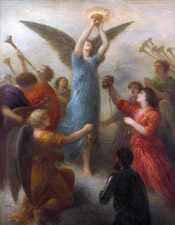Lohengrin
, translated by Dyer, Abigail (dyerabigail@gmail.com)
Lohengrin, composed by Richard Wagner, is a Romantic opera in three acts, first performed in 1850. The story draws from medieval German romance, particularly Wolfram von Eschenbach's “Parzival” and its sequel “Lohengrin” - comprising part of the legend of the Swan Knight.
The opera begins with the noblewoman Elsa of Brabant accused of murdering her brother, Gottfried. In her defence, an enigmatic knight (Lohengrin) arrives in a boat pulled by a swan, promising to marry her and defend her honour on the condition that she never asks his name or origin. Lohengrin wins the trial by combat against Elsa’s accuser, Friedrich of Telramund.
In the second act, Telramund and his wife Ortrud, a sorceress, plot to sow doubt in Elsa's mind about Lohengrin's mysterious identity. Ortrud manipulates Elsa, causing her to question Lohengrin's secret, with ultimately tragic consequences.
The final act reveals Lohengrin's divine origin as a Knight of the Holy Grail and the son of Parzival, who must depart when his identity is discovered. As Lohengrin prepares to leave, Ortrud confesses she had cursed Elsa’s brother to transform him into the swan. Lohengrin’s prayers revert Gottfried to his original form, the rightful Duke of Brabant. Elsa, however, overcome with grief, dies tragically as Lohengrin departs.
The opera is best known for its orchestral preludes and the Bridal Chorus, “Here Comes the Bride”. Lohengrin’s tale explores themes of faith, identity, and the struggle between the divine and the human, demonstrating Wagner's vision of opera as a total art form.

Dyer, Abigail
Support Open-Access:
Your contribution keeps our classical translations available to all. Every dollar helps support classics education and funds the expansion of our catalogue. Value what we do? Donate now.
File Downloads:
© Copyright, All Rights Reserved. This work may be freely reproduced, stored and transmitted, electronically or otherwise, for any non-commercial purpose. Conditions and Exceptions apply.